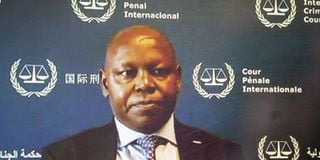Premium
Lawyer Paul Gicheru loses bid to appeal against ICC pre-trial chamber

Kenyan lawyer Paul Gicheru makes his first appearance before the ICC on November 6, 2020, before Judge Reine Adélaïde Sophie Alapini-Gansou of Pre-Trial Chamber A.
Kenyan lawyer Paul Gicheru has lost an attempt to lodge an appeal against a decision of the International Criminal Court (ICC) pre-trial chamber to confirm charges of witness interference in the crumbled case of Deputy President William Ruto.
Mr Gicheru, through his defence Michael Karnavas, wanted the chamber to allow him to file the appeal, arguing that the decision to confirm the charges was based on unreliable and uncorroborated hearsay statements of Prosecution witnesses.
But Judge Reine Adélaïde Sophie Alapini-Gansou (sitting at pre-trial Chamber A) dismissed the request saying it was based on a rule that does not apply in the case of Mr Gicheru.
The judge said the defence lacked legal basis to submit a request for leave to appeal pursuant to the rule, article 82(1)(d) of the Statute.
Appeal
The defence had premised its request on the rule -Article 82(1)(d) of the Statute - which provides that either party may appeal "a decision that involves an issue that would significantly affect the fair and expeditious conduct of the proceedings or the outcome of the trial".
In the intended appeal, Mr Gicheru wanted to argue that the confirmation of charges was erroneous because the court failed to properly assess the credibility of the prosecution witnesses in light of adverse credibility findings made by the Trial Chamber handling the case of Dr Ruto and journalist Joshua Sang.
Mr Gicheru has also boosted his defence team with the appointment of lawyer Suzana Tomanovic, an expert in international criminal law, from Bosnia and Herzegovina.
Ms Tomanovic, a lawyer on the list of Counsel of the International Criminal Court, has been appointed as Associate Counsel for Mr Gicheru to represent him in proceedings before the trial court.
Mr Gicheru, who is out on a Sh1 million bond, will be prosecuted before a Trial Chamber before Judge, Miatta Maria Samba from Sierra Leone and who joined the court in March this year.
The judge was allocated Mr Gicheru's case at Trial Chamber III last week by the ICC Acting President Judge Luz del Carmen Ibáñez Carranza.
In allocating the case, the acting president noted that the rules of the court (Statute) allow establishing of a Trial Chamber composed of one judge at the trial level with respect to offences against the administration of justice.
The acting president also took note that the 'existing judicial resources at the court are insufficient to meet the needs at trial level of the present case'.
Sound management
Also considered is the 'current and anticipated overall judicial workload of the court and the necessity to ensure sound management of the same, the need to expedite proceedings, the workload and individual concerns of the respective judges, their previous involvement in cases, as well as the experience and expertise of each judge'.
Judge Samba joined the Hague-based court in March this year alongside five others. Prior to her appointment, she served as a Judge of the Court of Appeal in Sierra Leone and her last position being a Judge of the Residual Special Court for Sierra Leone (RSCSL).
She is the eighth woman from Africa to serve on the ICC bench.
Mr Gicheru is facing eight charges related to bribery of key witnesses in the Ruto-Sang case over the 2007/8 post-election violence.
He offered them different amounts of money. The witnesses were central to the case but judges disregarded their testimony when their credibility became questionable.
One of the pillars of the prosecution's case against Dr Ruto and Mr Sang was the testimony by a woman who alleged that there was a war network established and utilised a communications system through which Dr Ruto and others directed and received reports from direct perpetrators carrying out the attacks.
The woman code-named in court filings as P-0613 testified about a conversation she had with an acquaintance, a youth, who participated in an attack on Turbo town in January 2008.
Text messages
“This person told her that Christopher Kisorio, Solomon Tirop and Farouk Kibet were in charge and were receiving directions from Dr Ruto. The witness understood that these directions were sent in text messages. Her acquaintance, who reported to Mr Tirop, had told her that Dr Ruto would send Mr Tirop messages containing messages such as ‘where are they’, and ‘how far have they gone," court papers state.
“Similarly, witness 613 assumed that the directions Ruto was allegedly giving to Kisorio, Tirop and Kibet were to be passed on to the youths, but did not explain the basis for this assumption. It is therefore noted that witness 613’s testimony as to the meaning of the text messages and the fact that they were passed on to youths is mere speculation,” Justice Robert Fremr said on April 5, 2016, in the verdict that the pair had no case to answer.
Another corrupted witness was P-800 who alleged that he witnessed first-hand, from his home, youths leaving in lorries. He even claimed to have spoken to some who he said provided him with details of the three-week training camp at a farm in Boronjo, Uasin Gishu County.
Evidence shows he was a member of a network group described by the prosecution as Common Plan, whose scheme was to corruptly influence witnesses that had been lined up against Dr Ruto.





